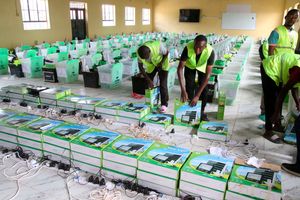Premium
Relief as Team Kenya’s first group cleared into Japan
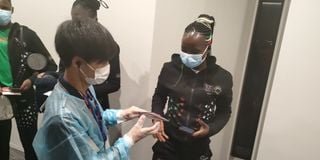
Malkia Strikers left attacker Leonida Kasaya (right) goes through the Covid-19 check ups at Tokyo's Narita Airport on July 9, 2021.
What you need to know:
- Strict Covid-19 protocols in place at Tokyo airport
In Tokyo, Japan
The eerie silence at one of Tokyo Narita International Airport’s special waiting rooms as a lady in a hazmat suit walked in Friday night was deafening.
And she gleefully seized the moment to send more chills down the spines of Team Kenya players and officials in the room with the opening word of her communication: “Unfortunately,” she said, “I have to tell you that all your results are…. negative!”
Her morbid sense of humour momentarily caught the Kenyan delegation off-guard, and the delayed loud cheer that greeted the latter part of her sentence echoed the feeling here as Tokyo welcomes the world to one of the most unique Olympic Games.
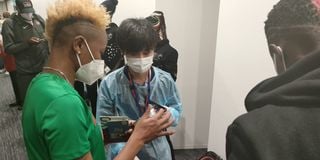
Malkia Strikers setter Jane Wacu (left) goes through the Covid-19 check ups at Tokyo's Narita Airport on July 9, 2021.
Postponed last year due to effects of the coronavirus pandemic, the Tokyo 2020 Olympics (yes, they are still officially referred to as Tokyo 2020 Olympics despite being held in 2021) are indeed special.
It’s considered a massive achievement these days merely boarding the plane to Japan, but what awaits the thousands of athletes, official and media travelling to these games can be traumatic.
Interesting times we live in.
First, it’s mandatory to undergo Covid-19 tests 96 hours before departure to Japan, and then again 72 hours before boarding the Tokyo-bound flight.
Upon arrival at Tokyo’s Narita International Airport, more intense screening awaits each new arrival, complete with fresh Covid-19 tests and massive paperwork to deal with.
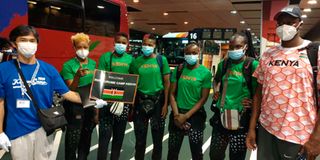
Malkia Strikers coach Paul Bitok (right) and players with a Kurume City Camp official at Tokyo's Narita Airport shortly after the first team of Kenyan Olympics landed in Japan on July 9, 2021.
Kenya’s first delegation of athletes and officials arrived at Narita at 7pm local time (2pm Kenyan time) Friday night but had to wait until 11:30pm to know their Covid-19 status – a massive four-and-a-half-hour wait!
And when the lady in the hazmat suit broke the great news, Malkia Strikers players and team officials burst into celebration, as though the hangman’s noose had been withdrawn on execution day.
Such is the reality of Covid-19 vigilance at these Games, but Malkia Strikers head coach Paul Bitok is confident of a great outing nonetheless despite the circumstances, happy that the first Team Kenya group to land in Japan had cleared the all-important first hurdle of testing negative for Covid-19.
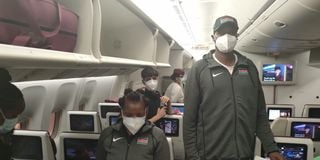
Malkia Strikers coach Paul Bitok prepares to disembark from the plane at Tokyo's Narita Airport on July 9, 2021.
“We’ve just received the results and they are negative – this is a good sign for Kenyans,” Bitok said as his players cheered on.
“We now leave for Kurume City where we have lined up our training programme, starting immediately, and we hope the other players will turn negative results so that we start the training together.
“We are still arranging for one or two friendly matches in Kurume City.”
Coach Bitok was accompanied by a squad of six players – Jane Wacu, Emmaculate Chemtai, Edith Wisah, Leonida Kasaya, Lorine Chebet and Gladys Ekaru.
Six more players are expected in Tokyo on Saturday, namely Mercy Moim, Noel Murambi, Agripina Kundu, Joy Luseneka, Sharon Chepchumba and Pamela Masaisai.
Left Nairobi
The latter group left Nairobi Friday night aboard Qatar Airways, transiting through Doha.
Team Kenya’s contingent that arrived in Tokyo yesterday flew alongside athletes from Peru and Hungary who equally celebrated their negative results and green light to enter Japan.
Shoaib Vayani, Kenya’s deputy head of mission to the Tokyo Olympics was elated upon the team’s clearance by strict, but strikingly friendly, Japanese immigration and Covid-19 control officials.
“It's a relief and now we are looking forward to travelling to Kurume,” Vayani, also chairman of Kenya’s sports shooting federation, said.
“We shall be staying overnight in Tokyo and then tomorrow morning, we will fly to Kurume City, acclimatise and also adhere strictly to the Covid-19 protocols because things are very strict here.”
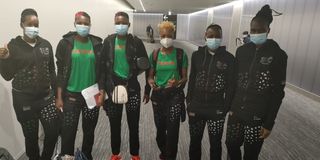
Malkia Strikers players pose for photos at Tokyo's Narita Airport on July 9, 2021.
The Kenyan team, just like all other delegations, will have to undergo virtually daily Covid-19 tests, with the officials and players served dinner in their rooms and not allowed to mingle at their Nikko Hotel stopover in Tokyo Friday night.
And such will be the general trend throughout the Games.
“We shall undergo Covid-19 tests almost daily for the first 14 days, so we must maintain Covid-19 protocols and train hard at the same time,” Vayani added.
The green light to enter Tokyo came as a huge relief to team medic Carol Akoth who has been charged with ensuring all Covid-19 protocols are followed to the letter by the Kenyan delegation.
“We are happy that we have all returned a negative result which is a good sign for our teams that are coming here from the bubble camp in Kenya,” she said, imploring the rest of the athletes and officials remaining in Nairobi with late arrival schedules into Tokyo to remain vigilant.
“The guys in Kenya should all keep it up and observe the protocols so that we can all get into the Olympic Village,” she pleaded.
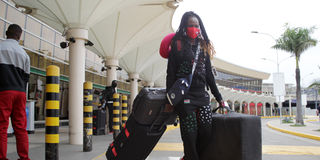
Malkia Strikers libero Agripina Kundu arrives at the Jomo Kenyatta International Airport on July 9, 2021 ahead of the team's departure to Tokyo for the 2020 Olympic Games.
Organisers of the Tokyo Olympic Games recently announced that all teams travelling to Japan for the competition should travel in small groups rather than one big contingent.
The rules stipulate that should anyone be Covid-19 positive, then the entire accompanying delegation is placed under mandatory quarantine, risking missing competitions.
Strict screening is being done at the point of departure to Tokyo with further stringent protocols in place upon arrival into Japan, including the mandatory downloading of official mobile telephone applications that trace one’s health records over a period before the travel to Japan.
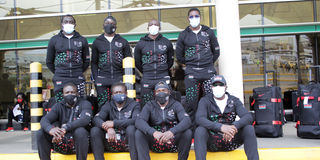
Kenya Sevens players pose for a group photo at the Jomo Kenyatta International Airport on July 9, 2021 ahead of the team's departure to Tokyo for the 2020 Olympic Games.
Kenya’s rugby teams are expected to depart Nairobi for Tokyo on Friday and Saturday with smaller delegations to follow, concluding with the men’s and women’s marathon teams in the first week of next month.




